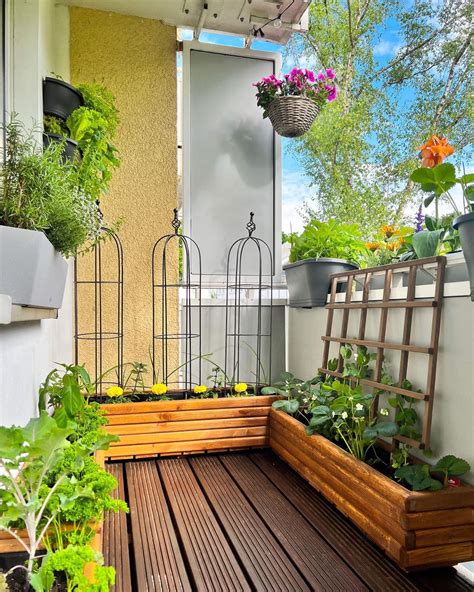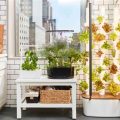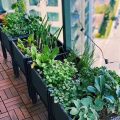How to Choose the Perfect Soil for Thriving Balcony Plants
Balcony gardening has gained popularity in recent years, particularly in urban settings where space is limited. But just because your garden is smaller doesn’t mean it’s any less important. The success of your balcony garden often hinges on one critical factor: soil selection. Whether you’re a novice or a seasoned gardener, understanding the best soil for balcony plants is essential for ensuring healthy plants and vibrant outdoor decor. This guide covers everything from basic concepts to advanced techniques, helping you make the right choice for your specific garden needs.
Key Concepts
- Balcony Gardening: Growing plants in limited spaces, often using containers or raised beds.
- Soil Selection: Choosing the right growing medium to suit plant needs and environmental conditions.
- Container Gardening: The practice of growing plants in containers rather than in-ground beds.
- Nutrients: Essential minerals and compounds that plants require for growth.
Historical Context
The art of urban gardening isn’t a new phenomenon. In ancient civilizations like Babylon, rooftop and balcony gardens were used to maximize green space in cities. Over the centuries, this practice has evolved, but the fundamental principles of choosing the right growing medium and plant care have remained central. Modern balcony gardening grew out of necessity in densely populated areas, where people sought creative ways to bring nature closer to home.
Current State Analysis
With the rise in urban gardening, there’s been a proliferation of soil mixes tailored to specific needs, such as water retention, aeration, and nutrient content. The average gardener now has access to a variety of soils for specific plant types, making soil selection easier yet more complex. For instance, succulents require sandy, well-draining soils, while leafy vegetables benefit from nutrient-rich, moisture-retentive soil.
Practical Applications
- Container Drainage: Ensure that your containers have adequate drainage to prevent root rot.
- Mixing Soil: For better control, many gardeners opt for creating their own soil mix. A common recipe includes 40% compost, 30% peat or coco coir, and 30% perlite or vermiculite.
- Amending Store-Bought Soil: Even the best soil can be improved. For example, adding perlite can enhance aeration, while compost boosts nutrients.
Case Studies
| Plant Type | Recommended Soil | Key Nutrients | Special Considerations |
|---|---|---|---|
| Succulents | Sandy, well-draining soil | Low nitrogen | Avoid overwatering |
| Herbs (e.g., basil, thyme) | Light, airy soil | Nitrogen, phosphorus | Good air circulation |
| Leafy Vegetables | Compost-rich soil | Nitrogen | Ensure consistent moisture |
| Flowering Plants (e.g., Geraniums) | Moisture-retentive, rich soil | Potassium, phosphorus | Deadhead regularly |
Stakeholder Analysis
Different groups benefit from improving balcony garden soils. Urban residents, horticultural suppliers, and even city planners have a stake in promoting healthy plants. Companies that sell soil amendments can see increased sales as people understand the need for specialized growing mediums. Meanwhile, municipalities benefit from the environmental and aesthetic benefits of urban greenery.
Implementation Guidelines
- Assess Plant Needs: Each plant type has specific soil requirements. Research your plants thoroughly before planting.
- Test Soil Drainage: Before planting, test your soil by watering it. If the water pools on the surface or drains too quickly, consider adding organic material or perlite.
- Amend Regularly: Balcony plants can quickly deplete nutrients, so amend soil with compost or fertilizers throughout the growing season.
- Monitor Watering: Balcony plants are more susceptible to drying out, especially in small containers. Ensure consistent moisture levels by monitoring the soil regularly.
Ethical Considerations
When choosing soil and additives, it’s important to consider the environmental impact. For instance, peat is a common ingredient in many potting soils, but its extraction is damaging to delicate ecosystems. Look for more sustainable options like coco coir or composted materials. Supporting companies that prioritize sustainable and organic products can help mitigate the environmental toll of balcony gardening.
Limitations and Future Research
While soil selection is a critical component of balcony gardening, it’s not a one-size-fits-all solution. Climate, plant species, and container type also play pivotal roles. Future research could focus on optimizing soil mixes for vertical gardens and other emerging urban gardening trends. Additionally, studying the long-term effects of various soil amendments on container plants could lead to more sustainable practices.
Expert Commentary
As gardening experts continue to research the best practices for urban gardening, it’s clear that the choice of soil is one of the most important factors in ensuring a successful balcony garden. Experts agree that mixing your own soil, while requiring more effort, allows for better customization based on plant needs. Furthermore, the trend toward sustainable soil practices, such as using compost and avoiding peat, is likely to grow as environmental concerns become more prominent.


